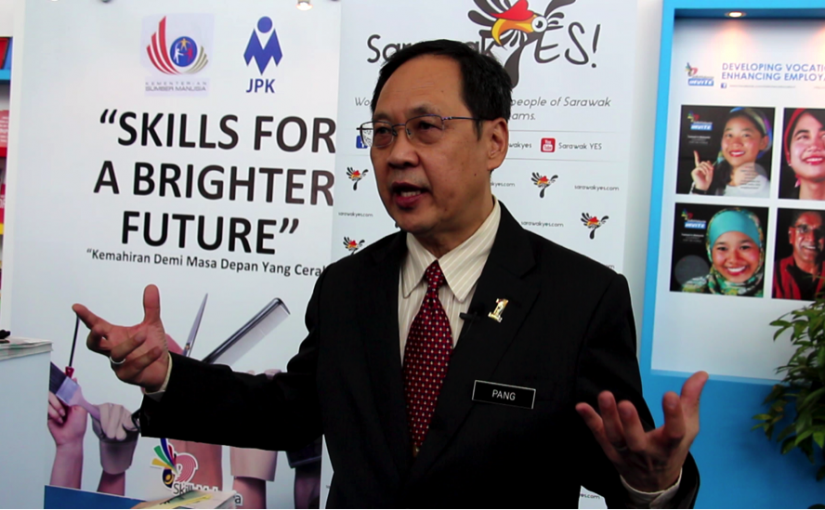At last week’s World TVET Conference 2015 in Kuching, SarawakYES! spoke with Datuk Dr. Pang Chau Leong, Director-General, Department of Skills Development, Ministry of Human Resources. He discussed the incredible number of TVET careers now available to young Sarawakians and the continued rapid expansion of opportunities in these areas.
Q: Why do you see the importance of promoting TVET in Sarawak?
A: I think this is the era for TVET, throughout the world, not just in Sarawak. We see that TVET has become a very, very, important platform for youngsters to get a good career for themselves. And I think we also see that TVET is very important today because most of the new jobs that are going to be created in the future will require not just academic qualification, but increasingly TVET qualification. And that is where the opportunities are, that is where the high-paying jobs are. I think it will be a disaster if we do not grab that opportunity. I think we certainly need to reach out to our youth, to parents, so that they look at TVET as also an opportunity for them to do well in life.
Q: What are the types of jobs that require a TVET qualification?
A: We can see the abundance of opportunities now. We have seen that increasingly, apart from the traditional areas – automotive, engineering, manufacturing – but increasingly TVET qualification is also required in service sectors. You see a lot of opportunities in tourism and hospitality and the hotel industry, in the banking industry, in the finance industry, as well as even in areas like biotechnology, aerospace, maritime. Now you can see TVET offers tremendous opportunities … cutting across semi skills and even to the technology level. And these are the opportunities that are now really available, which I see will be expanding as the state of Sarawak especially, and the country at large, continues its very aggressive growth path in the future.
Q: How do you see TVET expanding in Sarawak and Malaysia?
A: Definitely there is great potential. We know that Sarawak is very, very, determined to be a developed State by 2020 … through the SCORE program and so many development corridors. What this means is that there will be creation of high quality jobs – no longer the low skills, manual kind of jobs – jobs that require a high level of skills to handle more sophisticated technology, more high valued-added work processes, and you don’t get to work in those kind of areas unless you are also qualified and you are also skilled. And that is where TVET becomes extremely vital as the stepping-stone for our youth or school leavers to be able to grab those job opportunities that are definitely going to open up as the State progresses in various directions.
Q: What is the biggest challenge for expanding TVET in Sarawak?
A: We have to admit there is still a very negative perception of TVET and skills. I would even say that there is a societal stigma. TVET and skills are still perceived to be like a poor cousin of academic qualifications. Some even say that these are for dropouts; these are those failures from the academic system. I think that is a really, very obsolete way of thinking now. We see throughout the world that TVET has become the new hope, the new enabler of good paying jobs, with high prospects, upward mobility prospects. We’ve got to get rid of that mindset, society at large, parents should not deem their sons and daughters as failures if they choose the vocational stream, the TVET stream. It is not necessary now that the academic pathway is the only way forward. So we have to get rid of that kind of mental block, as the Chief Minister said this morning, a mental block that parents and school leavers perceive TVET as for those deemed to be failures. On the contrary … we need to now believe and have confidence that with a TVET qualification it can also promise a very promising career.
Q: How can more Sarawakians be encouraged to pursue a career in these areas?
A: I think it is very important … to tell Sarawakians, to tell Malaysians, to tell society at large, look at TVET, the opportunities it offers. Look at TVET and have confidence, because we are no longer talking about very low skills … we are talking about world-beaters. Look around, you’ll see some of our TVET students have gone to the world skills competition and they have performed and they have won medals…to show that the training in Malaysia by our local training providers is now world class and high quality. Therefore, parents should have the confidence that if they send their children to TVET providers, they are sending them to good hands.
And of course a lot of it depends on information and awareness, and we want youth, school leavers, to be aware and also to have the knowledge that, for example, in Sarawak there are more than 80 institutions that offer TVET programs. So there’s opportunities, high quality training – it’s for them to come and find out and learn, make their choice and be ready to face the world and do well in the world. We can do it.




